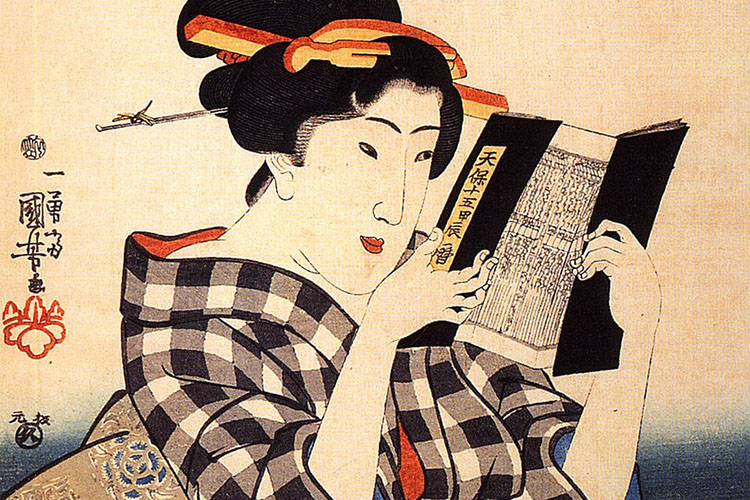Q&A: Rewriting history in the age of #MeToo
Northwestern University associate professor Amy Stanley will give a Nov. 14 lecture on the #MeToo movement's influence on academic work.
November 7, 2018
How can historians support the #MeToo movement? Peter Zinoman, chair of UC Berkeley’s history department, invited Amy Stanley, associate professor of history at Northwestern University, to speak about that question next Tuesday, Nov. 13, at 4 p.m. A recent essay by Stanley had caught Zinoman’s eye — about how the movement prompted her to rethink the story of Tsuneno, a Japanese maidservant in the early 1800s, whose letters home Stanley had examined.
“Amy will shed light on how recent insights that come out of the #MeToo movement can change the way that scholars read and evaluate historical testimony about sexual violence and discrimination,” says Zinoman. He adds that he hopes Stanley’s visit also will continue to help “bring out of the shadows” the persistence of gender bias and sexual harassment on college campuses nationwide.
UC Berkeley News recently asked Stanley about why she is rewriting Tsuneno’s story and why special care should be taken, in the pursuit of historical truth, with the stories of powerless people.

Amy Stanley, associate professor of history at Northwestern University, will speak at Berkeley about “Rewriting History in the Age of #MeToo” on Tuesday, Nov. 13. (Photo courtesy of Amy Stanley)
Who was Tsuneno, and why did you study her?
Tsuneno was a completely obscure person and, to my knowledge, the only person to write about her has been Gotō Kazuo, a local historian in Niigata, Japan. But her story is compelling: She was born the daughter of the local Buddhist priest in a very small village in 1804, and after marrying and being divorced three times, she ran away to the huge city of Edo and eventually ended up in the service of a famous Edo city magistrate. And she wrote very vividly about her feelings. As a result, she’s well-known to the archivists in Niigata, who consider her one of their favorite local characters, and to people who come to the archive to read local history.
I started studying Tsuneno by accident. At Northwestern, I was designing an undergraduate survey course in early modern Japanese history (1600-1868), and I was frustrated that I didn’t have enough English-language material to assign to my students. One of the most wonderful things about Japanese history is the extensive documentary record, and I wanted my students to have some idea of what it was like to discover all the written traces of everyday life — land transfers, adultery cases, household inventories, birth records, etc. — that are available in Japanese archives.
So, I started looking for archival materials to translate, and I ended up on the website of the Niigata Prefectural Archives, which runs an “online document reading course” for local people who want to learn more about their own history. One of the documents was a letter by Tsuneno: She had written home to her mother after running away to the big city, marveling at how good the food was and explaining her work as a maidservant for a fantastically rich man who was building a teahouse for his concubine. I learned there were dozens more letters to and from Tsuneno in the archive, so I went to investigate and decided to write her story.
Tsuneno left her home in Japan, without permission, with a man named Chikan, who eventually stole from and abandoned her. What else did you learn about him?
Chikan claimed to be a junior Buddhist priest at a temple in a village near Tsuneno’s home village. Her brothers, who were priests themselves, later doubted this story — apparently, they didn’t think someone who behaved so badly could possibly be a priest. The funny thing about him is his name: “chikan” is modern Japanese for a man who gropes women, particularly on crowded trains. But that’s just a coincidence. I know nothing about Chikan other than what Tsuneno wrote about him.
In a 2016 article for the American Historical Review, you skirted the issue of Tsuneno’s relationship with Chikan, even though she’d written to relatives that he had “impure intentions” and was so coercive that she “did what he wanted.” Why?
At first, I somewhat doubted Tsuneno’s story, because she had so many reasons to lie. When I gave talks about Tsuneno, I considered all these reasons — for example, that she needed her brothers’ approval and sympathy, that running away with a lover was considered worse than just running away, or that she hated Chikan after he had abandoned her and was embarrassed that she had been his lover. By the time I wrote my piece for AHR, I wasn’t sure exactly what happened, and I also wasn’t convinced it really mattered — that article was, in part, about “cultural narratives,” the stories people hear and tell themselves — and so the important part was that she said he assaulted her. I was agnostic about the truth: what mattered to me was that, like many women around the world, she’d told this story.

Woodblock print of a Japanese woman from Tsuneno’s era, by Utagawa Kuniyoshi (1798-1861).
A year later, when the #MeToo movement began, how did your interpretation of Tsuneno’s story change, and why?
I’d been trying to be a responsible historian — we’re trained to rigorously interrogate all our sources. But I came to believe that our habitual attitude of skepticism might be unwarranted in some cases. After all, there are all kinds of possibilities for “what really happened,” but we only put some of them in writing. Why choose “she was lying” as one of them? What effect does that have on who we believe here and now?
I decided to believe Tsuneno, rather than introducing skepticism or maintaining the stance that it didn’t matter what actually happened. I made this conscious decision after thinking more deeply about the #MeToo movement’s call to “believe women.” The activists I followed on Twitter didn’t mean “believe all women all the time,” but they pointed out that men were often automatically believed, and women were assumed to be lying, and they wanted to reverse that assumption. I started to think about my own assumptions in my work, and why I couldn’t just believe Tsuneno, especially since there was no actual evidence that she was lying.
All relatively powerless people have reasons to lie, because their lives are so often on the line; it doesn’t mean that they aren’t telling the truth. Trauma can cause gaps in memory, and some truths are difficult to come to terms with or express coherently. I think I understand that better now, and it has compelled me to extend the benefit of the doubt to my historical actors.
What will do you with these new insights about Tsuneno?
I’m writing a book about Tsuneno for a popular audience, which will be published by Scribner in 2020. That’s going to be a more accessible story about a woman and her time. The result of all this rethinking is that I’m going to take her story that she was assaulted at face value and narrate it as something that happened to her, not as a fiction that she might have employed for a strategic reason.
You’ll also be speaking this month at Berkeley. What will be your message be?
I’m going to consider how the insights of the #MeToo movement might cause us to rethink some of our assumptions and practices as historians. Over the past few decades, we’ve gotten very good at approaching some kinds of evidence — hidden stories, silences, fractured narratives — in order to excavate the stories of overlooked or forgotten people. And we’ve gotten there through radical skepticism, often reading “against the grain” of the account or the archive we’re using. Clearly that has been productive and necessary. But is it also necessary to set that skepticism aside sometimes in order to “believe women”? And if so, when, and how do we do it? I’m going to discuss some of the accounts of sexual assault I’ve found in my own work to try to address these questions.
I’ll also add that it’s important to think about our professional as well as our intellectual lives. Sexual harassment and assault have always been problems in the academy: anywhere you have people with power — and as professors, we do have power over our students and junior colleagues — there are people who abuse it. One important thing for people in my position to do is to recognize our own power, not deny it or disavow it, and to think about how to use it responsibly and how to raise questions when we have doubts about how other people are behaving. That onus is on us — to make universities more egalitarian and safer places for everyone.
NOTE: Stanley’s talk, “Rewriting History in the Age of #MeToo,” will be held in Room 3335 of Dwinelle Hall on Tuesday, Nov. 13, at 4 p.m. The free event is being sponsored by the Department of History, Center for Japanese Studies, the History Graduate Association and the Committee on Equity, Diversity and Inclusion.